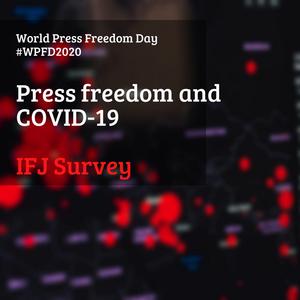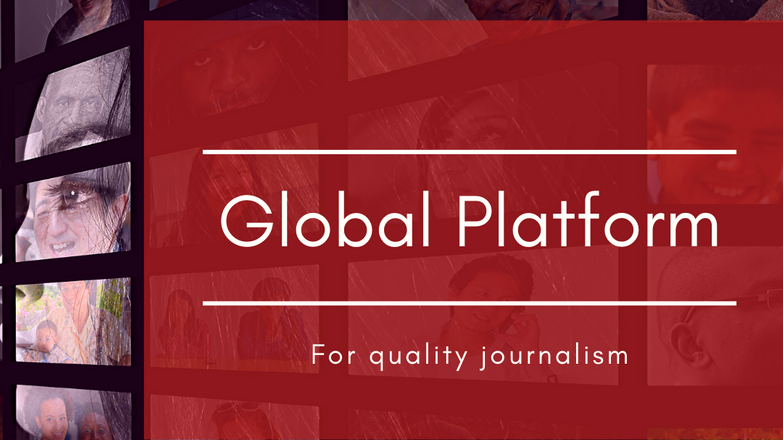IFJ launches global proposals in response to covid crisis
IFJ survey shows depth of crisis for media and demands urgent action to save jobs, protect independent media and fund quality journalism.
Three in four journalists have faced official restrictions, obstruction or intimidation in reporting on covid-19, according to a major new survey of more than 1300 frontline journalists in 77 countries.

© IFJ
Two-thirds of staff and freelance journalists have also suffered pay cuts, lost revenue, job losses, cancelled commissions or worsening working conditions, according to the survey carried out by the International Federation of Journalists between 26-28 April.
The IFJ is the world's largest organisation of professional journalists representing 600,000 journalists in 146 countries.
The survey of 1308 journalists also revealed that as a result of the covid-19 pandemic:
- Nearly every freelance journalist has lost revenue or work opportunities
- More than half of all journalists are suffering from stress and anxiety
- More than a quarter lack essential equipment to enable them to work safely from home, while one in four lack any protective equipment to work in the field
- Dozens of journalists have been arrested, faced lawsuits or been assaulted
- More than a third of journalists have shifted their focus to covering covid-19 related stories
When asked about the state of media freedom in their country the vast majority said it had worsened. From Greece to Indonesia and from Chad to Peru, journalists used words such as precarious, problematic, terrible, worse, declining and highlighted restricted assess to media freedoms.
Respondents also exposed the toll on journalists with many citing job losses, longer hours and fewer resources as obstacles to proper coverage of the pandemic. In many countries, the lack of social protection and fair employment are driving journalists to desperation.
One female Peruvian freelance journalist told the IFJ:
"The state is unprepared for this pandemic, there are sectors in total abandonment by the authorities, corruption continues, while at the same time media companies have shown they do not have institutional policies to alleviate our despair, such as the lack of income. Many families are on the edge of poverty."
A Greek journalist added:
"I work more but earn less money and the newspaper owner I work for owes me and my colleague over 7 months pay but the government does nothing about this."
Many journalists complained of increasing attacks on media freedom. Almost one in four journalists said they had faced growing difficulties accessing information from government or official sources.
Many reported being verbally attacked by politicians. Others complained of restrictions on asking questions at press conferences and restrictions being imposed on the movement of journalists during the crisis, including the withdrawal of recognition of press cards. Some worried that the total focus on covid-related stories meant other important issues were being ignored.
One female Brazilian journalist said:
"The federal government despises journalists. It attacks the press every day for the information it publishes and discredits and humiliates journalists".
A male journalist in India added:
"Press freedom has become increasingly restrictive. Journalists have been arrested for reporting stories highlighting the government's shortcomings."
Respondents also praised journalists for risking their own safety to report on the pandemic and for trying to seek out independent sources and counter disinformation.
A Portuguese journalist said:
"There are bad situations – more press releases, less real reporting, press conferences without questions, we work more hours, a lot more hours, cell phones don't stop, we are confined, always working, it's bad for our health. Yet there's also a sense that we are going through extraordinary times and journalists are responding, there's more motivation to report. Like with doctors and health staff, this is also a time for journalism".
The IFJ is calling for urgent action to save jobs, protect independent media and fund quality journalism and has launched a Global Platform for Quality Journalism demanding urgent measures to protect and reinforce public interest journalism including:
- A tax on the revenues of tech giants such as Facebook and Google to create a global fund to support independent media
- The use of tax and fiscal policy to reduce the burden on journalists and media
- Health and public advertising campaigns to support local media
Anthony Bellanger, IFJ general secretary, said:
"These results show a worrying trend of declining media freedom and cuts to journalism at the very time when access to information and quality journalism is so crucial. Journalism is a public good and it deserves public support and an end to political obstruction and interference."

IFJ Global platform for quality journalism
The IFJ has launched a series of global proposals in response to the coronavirus crisis.
